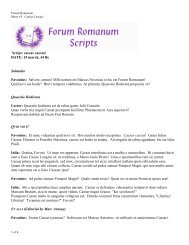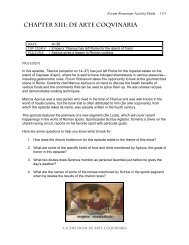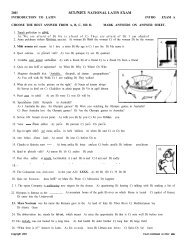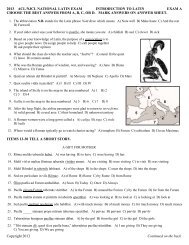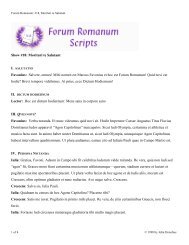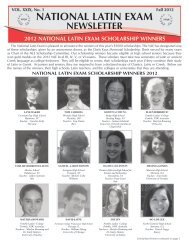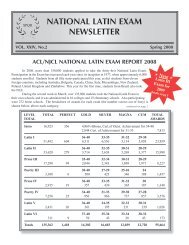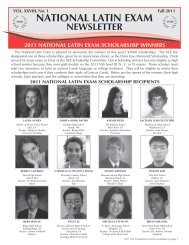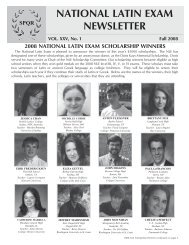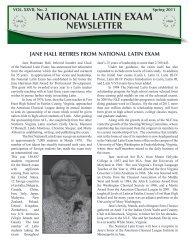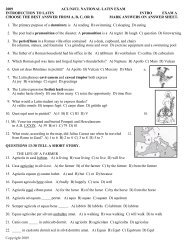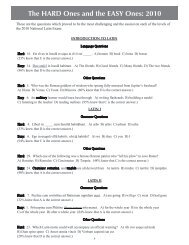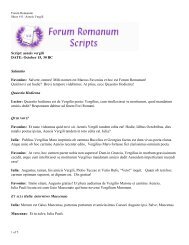2011 Intro Latin Exam - The National Latin Exam
2011 Intro Latin Exam - The National Latin Exam
2011 Intro Latin Exam - The National Latin Exam
You also want an ePaper? Increase the reach of your titles
YUMPU automatically turns print PDFs into web optimized ePapers that Google loves.
24. Servus Rūfus cibum nōn habet. A) is now having B) always has C) does not have D) often has<br />
25. Rūfus culīnam intrāre timet. A) is entering B) to enter C) was entering D) enters<br />
26. Coquus rogat, “Exspectāsne, Rūfe, cibum?” A) Are you waiting for B) Was he waiting for C) What are you waiting for<br />
D) Why is he waiting for<br />
27. “Ubi est cēna mea?” dominus in trīclīniō clāmat. A) Why B) What C) How many D) Where<br />
28. Coquus dominō cēnam dat. A) of the master B) to the master C) from the master D) with the master<br />
29. Dominus clāmat, “Da mihi vīnum!” A) I B) to us C) to me D) we<br />
30. “Quis est in culīnā?” dominus coquum rogat. A) Why B) What C) Where D) Who<br />
READ THE REST OF THE STORY AND ANSWER THE QUESTIONS.<br />
MISSED MEALS<br />
“Rūfus ad iānuam cibum exspectat,” coquus respondet. 1<br />
“Vocā Rūfum!” dominus clāmat. “Nōs servīs cibum 2<br />
iam dedimus!” 3 iam dedimus = we have already given<br />
Dum dominus cēnam cōnsūmit, coquus Rūfum vocat. 4 Dum = While; cōnsūmit = is eating<br />
Dominus multum cibum habet sed Rūfus nūllum cibum habet. 5<br />
Dominus clāmat, “Cūr octō equōs meōs in agrīs nōn cūrās? 6<br />
Cūr cibum exspectās? Nōs servīs cibum iam dedimus.” 7<br />
Rūfus respondet, “Quod ego equam gravidam heri cūrābam, 8 equam gravidam = pregnant horse; heri = yesterday<br />
cēnam nōn habēbam. Hodiē ego equōs īnfirmōs cūrābam et 9 īnfirmōs = weak<br />
iterum nōn ēdī.” 10 iterum = again; nōn ēdī = I did not eat<br />
“Sed quis octō equōs meōs nunc cūrat?” dominus rogat. 11 nunc = now<br />
“Hodiē sunt decem equī, domine,” Rūfus respondet. 12<br />
“Heri equa geminōs peperit. Geminī erant īnfirmī et ego 13 geminōs peperit = gave birth to twins<br />
eōs cūrābam. Hodiē decem equōs pulchrōs habēs!” 14 eōs = them<br />
“Tū es bonus servus!” dominus clāmat. “Tū numerum 15<br />
equōrum meōrum auxistī. Ego tibi cibum laetē dō, 16 auxistī = you have increased<br />
quod tū bene labōrās.” 17<br />
31. What is Rufus doing in line 1? A) waiting at the door B) pacing in the street C) looking away from the food<br />
D) sending a note<br />
32. In line 4, what does the cook do? A) closes the door B) calls the slave C) clears the table D) has dinner<br />
33. What is the master doing when Rufus enters (line 4)? A) dictating a letter B) eating dinner C) drinking wine<br />
D) praying to the household gods<br />
34. In line 6, the master thinks Rufus should be in the A) kitchen B) forum C) fields D) doorway<br />
35. In lines 6-7, the master is upset because Rufus A) should have already eaten B) always eats too much<br />
C) is shouting now D) has stolen a horse<br />
36. In lines 8-10, why is Rufus hungry? A) he was sick B) the master does not feed the slaves<br />
C) another slave stole his dinner D) he was working during dinner<br />
37. In line 11, how many horses does the master think he has? A) one B) two C) eight D) ten<br />
38. Who was taking care of the twins (lines 13-14)? A) the master B) Rufus C) the cook D) the female horse<br />
39. In lines 15-16, why is the master happy? A) the lost horses have been found B) his dinner was good<br />
C) Rufus stopped a thief D) he owns more horses<br />
40. <strong>The</strong> lesson illustrated by this story is A) good work brings rewards B) secrets are hard to keep<br />
C) beware of strangers bearing gifts D) a simple life is best<br />
Copyright <strong>2011</strong>



